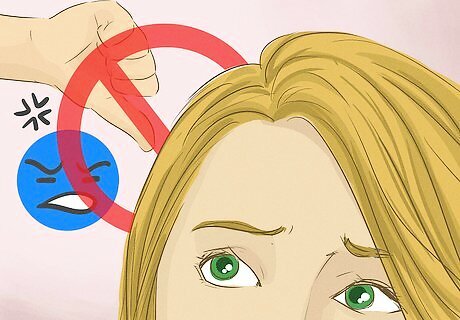
views
Talking to People Who Underestimate You

Be assertive. Assertive communication will help you express yourself clearly and maintain self-respect; it can help you feel more positive about yourself and your abilities, also. This style of communication can even aid you in your own self-perception, because you are outwardly describing your thoughts and expressing how you feel. Finally, it can help other people understand you better, because you aren't keeping them in the dark and leaving them to guess about what you are thinking or feeling. If someone is underestimating you, being assertive is a great way to stop her in her tracks. Here are some tips for more assertive communication: Use "I" statements. This is a great way to put your feelings out there without blaming anyone else. For example, you can say, "I think I'm perfectly capable of dealing with these new job responsibilities" rather than, "You're wrong about my capabilities." This strikes a great balance between expressing yourself while not being too grating or confrontational. Rehearse what you want to say beforehand. Practice will make you more confident in your communications, because you know you've prepared for the situation. Try your new skills on a small scale first. Avoid immediately going to your boss and telling him how you feel. Try being assertive with your friends, family, and peers, when it's appropriate.

Ask why. Although you shouldn't always listen to people who underestimate you, it may be useful to hear them out when it comes to their criticisms. You may be able to use their criticism constructively, whether it's intended that way or not. If you can avoid letting the criticism injure your self-esteem, it can end up motivating you and being a valuable source of information. For example, you can say "I hear what you're saying. Why do you think I'm not capable of doing well in this job position? I'd like to hear your views so I can improve." This strategy is best for people who underestimate you but aren't trying to be mean to you, such as in cases where your boss might question whether you're capable of performing a task because he's seen you fail at it before. You don't need to buy into it or agree with her about your capabilities, but you can use the criticism constructively.

Practice deep breathing. Take a few deep breaths, inhaling so that your stomach expands while your chest stays in place. This is a quick and easy way to calm yourself that requires little effort. You can do this right before responding to people who underestimate you, so that you can handle their critique of your abilities with less tension and more calm confidence. Deep breathing stimulates the parasympathetic nervous system in your body (the “rest and digest” branch), which is in charge of helping you feel calm. It's also okay to collect yourself for a moment if you're feeling overwhelmed! You might pop into the bathroom for a second to reorient yourself.

Show through your actions. One of the best ways to counteract critics who underestimate you is for them to see you succeed at the thing they're underestimating you on. If someone is underestimating you, try to ignore and just focus on mastery of the task you're working on. This is a great way to use their underestimation of you as motivation. Remember though that if you fall short of your mark, what matters is how you feel about it, not others. For example, you can say "You're certainly entitled to your opinion, but I'd rather let the outcome speak for itself, rather than let you decide whether I can do this or not."

Avoid responding to rudeness. If someone is really harsh in underestimating you, avoid giving her the satisfaction of a reaction. For example, if someone tells you that you'll never amount to anything, simply ignore the comment or walk away. There's nothing to be gained from engaging with people who say this kind of thing. You can prove her wrong with your actions, but you don't need to talk to her about it.
Proving Them Wrong

Focus on your goals. It's easy to get swept up in the painful experience of being underestimated, but the best way to prove your critics wrong is to focus on what you want to achieve. Instead of obsessing over what someone says, use the anger or sadness as motivation to work that much harder on pursuing your interests and responsibilities. Avoid taking it so personally that it negatively affects your performance. Focus on your own life instead, putting her critique on the back-burner. Putting your attention toward positive goals and dreams can help you be more creative and open to new ideas, which will help you prove wrong anyone who underestimates you.

Keep your goals reasonable. One of the biggest challenges to being successful is figuring out how to set goals that are actually achievable. Often, we set goals that are, instead, unachievable. Many New Year's resolutions fall under this category, such as going to the gym every day or never making another mistake at your job. Aiming high like this can actually cause you to fall flat, because when you do fail to reach the bar, you'll likely get frustrated and give up. Setting smaller, more concrete goals can help you make progress without focusing so much on perfection. Set concrete goals such as "walk 1 mile (1.6 km)" or "try to make fewer than 3 mistakes on the job per day." Goals like these will help you feel the satisfaction of achievement while also working toward bigger things. Reward yourself when you meet a goal. This is especially important for activities that don't involve their own immediate reward, such as writing and publishing an essay or work of fiction. Many goals have delayed rewards, which means that you might not associate them with the positive feelings you receive later on. Reward yourself immediately by having some chocolate, seeing a movie, or hanging out with friends.

Work hard on areas of challenge. Sometimes it's best to focus on improving your weaknesses rather than on making gains in areas where you’re already competent. If someone has identified something you could legitimately improve on, take this seriously and work to become better than you were before. For example, if you work in retail and you're amazing at customer service, but you don't feel entirely confident at the register, devote time to learning the ins and outs involved at the register.

Recognize and refute negative self-talk. It's easy to sabotage ourselves with old beliefs that we carry over from when we were younger. We sometimes continue to adopt negative views we learned about ourselves from parents, siblings, peers, or someone else; sometimes we may not even be aware that we are holding these views. Examine the truth of these messages. For example, if someone told you that you're naturally not good at math, try to look for objective information that may indicate whether or not this is true. Were you bad at math before people started telling you what you're capable of? Do you really think you're incapable, or does the belief influence how you act toward math? Counter the lie. If someone told you that you're bad at math, but you think that may not actually be true, go out and prove her wrong. Take an extracurricular math class so you can study up and become a math wiz. Alternatively, work some math lessons online or hire a private tutor. Avoid letting these kinds of messages you received earlier in life dictate how you live now.

Remain committed. Even if you do make mistakes and fail at a task, avoid giving up. Errors are often inevitable and even necessary on the way to being good at something. Mistakes can lead to deeper insights about yourself and your life. Many of the world's most successful people were not instantly successful, such as Michael Jordan, Stephen King, and Albert Einstein. To stay committed to a task, keep the end goal in mind. Think about how your life or the lives of your family will be better if you succeed. Think about the people Remind yourself that mistakes are learning opportunities, this may make you less likely to give up upon initial failure. Make your goals explicit. Whatever you are being underestimated on, make it explicit so that it has a clear answer. Vague goals are associated with a lack of commitment. For example, if someone is underestimating you on your math skills, set specific goals for how to improve, such as solve 10 math problems from your textbook a day. This will provide a more explicit, actionable, and concrete way to remain committed when someone is underestimating you rather than something vague such as "be good at math".
Re-Assessing Underestimation

Understand what being underestimated and criticized can do to you. Being underestimated and criticized can cause us to feel badly about ourselves. The resulting sadness can close us off from seeing available options, ultimately causing our performance to suffer. Keep this in mind when you are reacting to being underestimated. If you feel like you can't handle what someone is saying and it's getting you down, respond appropriately, such as refusing to engage with her. It may seem like you should be able to control how you feel about what she says to you, but it's not always that easy. Sometimes, being criticized can cause you to freeze up, especially if you were criticized or berated as a child. That instinct to freeze up may follow you into adulthood.

Ask yourself why someone would underestimate you. An easy way to defuse someone's criticism of you is to understand her underlying motivation for doing so. Sometimes, people believe that others can't do something in order to protect their own lack of self-confidence. If she doesn’t think she can do it, then it might make sense for her to think that you can't do it either. Be on the look out for the kind of people who belittle others because of their own feelings of inadequacy. Avoid taking it personally when you come across them and get a taste of their insecurity.

Go easy on yourself. If you have trouble not taking it personally, have some self-compassion. Perhaps you haven't had enough people believe in you in the past. Did you have a critical parent or friend who would knock you down and tell you that you couldn't achieve your goals? It's hard to recover from those kinds of experiences, but with dedication and self-compassion you can begin to believe in yourself. For example, say to yourself "I understand why I'm hard on myself. It isn't my fault. I know I can become more compassionate toward myself." Pretend that you're talking to a close friend. Would you say those kinds of negative comments to them?

Avoid drawing conclusions too quickly. Many people are quick to jump on someone's "weaknesses" without really observing them for a long time. Just because you make one mistake doesn't really provide that much information about whether you are bad at something. In fact, making a mistake, or otherwise doing something not that smart, is not very indicative of your abilities. The fact is, intelligent people do silly, unintelligent things all the time but unintelligent people rarely do really intelligent things; that is to say that, making a mistake is not that diagnostic of your abilities. Also, don’t make mountains out of molehills and watch for other people doing it to you as well. You may even want to say to her, for example, "You've only seen me perform this task once or twice. I don't think you can really give a fair assessment right now."

Don’t expect perfection for yourself. If people criticize your abilities, it can be good to take this as a challenge and work toward bettering yourself, but also keep in mind that no one is perfect. There will naturally be areas in which you excel and areas that present a greater challenge to you. This doesn't mean you shouldn't try to improve, but at some point it can be helpful to accept where you're at rather than strive 24/7. Try to find a balance between working on improving your abilities and accepting yourself the way you are. Perfection causes people to be self-absorbed and can even result in problems with anxiety or depression. To challenge perfectionism, it helps to first recognize it in yourself. Ask yourself the following questions: "Do I have often fail to meet my own standards?", "Do I often get depressed, anxious, or frustrated trying to meet my standards?", "Has someone told me my standards are too high?", "Do the standards I set for myself get in the way of other parts of my life, such as my social life?" If you answered yes to any of these questions you may have trouble with perfectionism. Fight against perfectionism by trying out positive realistic thinking. For example, when you are working on a task, try saying to yourself "no one is perfect" or "I can do my best, nothing more", or "it's ok if not everyone likes me". You can also try looking at the big picture as a way to challenge perfectionism. Try asking yourself "what is the worst that can happen?" or, "will this still matter tomorrow? Three months from now? A year from now?"




















Comments
0 comment